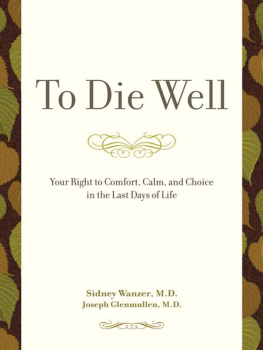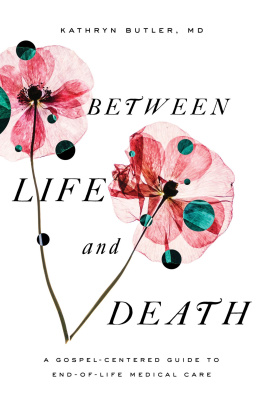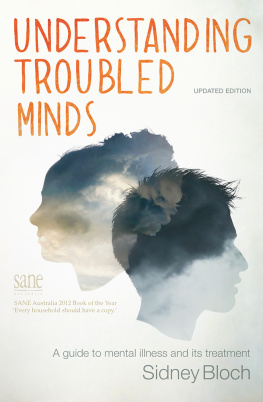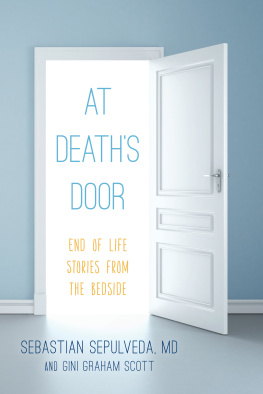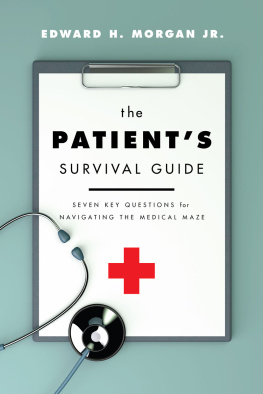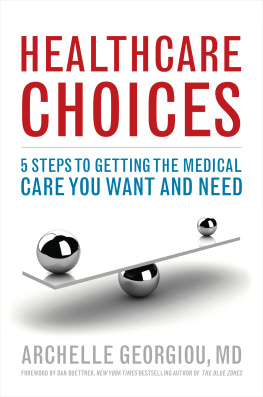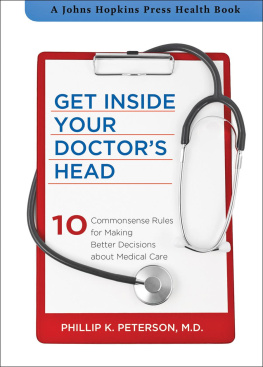TO DIE WELL
TO DIE WELL
Your Right to Comfort, Calm, and Choice in the Last Days of Life
Sidney H. Wanzer, MD
with Joseph Glenmullen, MD
Many of the designations used by manufacturers and sellers to distinguish their products are claimed as trademarks. Where those designations appear in this book and Da Capo Press was aware of a trademark claim, the designations have been printed in initial capital letters.
Copyright 2007 Sidney H. Wanzer and Joseph Glenmullen
All rights reserved. No part of this publication may be reproduced, stored in a retrieval system, or transmitted, in any form or by any means, electronic, mechanical, photocopying, recording, or otherwise, without the prior written permission of the publisher. Printed in the United States of America.
Designed by Timm Bryson
Cataloging-in-Publication data for this book is available from the Library of Congress.
First Da Capo Press edition 2007
First Da Capo Press paperback edition 2008
HC: ISBN-13: 978-0-7382-1083-4
PB: ISBN-13: 978-0-7382-1163-3
eBook ISBN: 9780786732302
Published by Da Capo Press
A Member of the Perseus Books Group
www.dacapopress.com
Note: The information in this book is true and complete to the best of our knowledge. This book is intended only as an informative guide for those wishing to know more about health issues. In no way is this book intended to replace, countermand, or conflict with the advice given to you by your own physician. The ultimate decision concerning care should be made between you and your doctor. We strongly recommend you follow his or her advice. Information in this book is general and is offered with no guarantees on the part of the authors or of Da Capo Press. The authors and publisher disclaim all liability in connection with the use of this book. The names and identifying details of people associated with events described in this book have been changed.
Da Capo Press books are available at special discounts for bulk purchases in the U.S. by corporations, institutions, and other organizations. For more information, please contact the Special Markets Department at the Perseus Books Group, 2300 Chestnut Street, Suite 200, Philadelphia, PA 19103, or call (800) 255-1514, or e-mail .
10 9 8 7 6 5 4 3 2 1
Against the complicated setting of modern medicine,life prolongation, and dying, I write this book forpatients, families, and caregivers, in an effort toexamine what contributes to a peaceful death andwhat does not. Specifically, the book is dedicated tothose patients who did not have a peaceful death.
PREFACE
Ive watched many families struggle with end of life. In this book I describe from my practice what has worked and not worked in the treatment of the dying patient, and I give the reader my observations as to what can ensure, as nearly as possible, a peaceful dying process.
Based on experiences from my practice and interactions with my colleagues, I address the turning points near the end of life when it is time to redefine the purposes of medical treatment. Is the goal to restore health, or is it time to change gears and instead concentrate on shepherding the patient as comfortably as possible through the dying process? Has life become so intolerable that dying is preferable to continued living? These are questions that need to be asked in a formal way with purposeful reasoning whenever a person is approaching the end of life. We shall see that a proper definition of the goals of treatment is critical to a peaceful dying.
This book also explores the ways in which patients and families can work with physicians to maintain control over the manner of dying. There are important questions to ask of physicians, appropriate in a time when the former paternalistic approach by doctors is being replaced with shared decision-making in which patients and families wishes are paramount.
Ive been able to write this book because of my own experience in the practice of medicine, in addition to work with organizations that promote the rights of the dying patient. Ive written on end-of life-issues, and in the 1980s was the lead This belief, addressed in the chapters on hastened death, I still hold firmly.
The hastening of death in a terminal situation is different from what we usually consider as suicide. Most of the time, we think of suicide as an inappropriate ending of life in a person who is psychiatrically depressed, whereas at the end of life the hastening of death in a situation of intolerable suffering should be regarded more appropriately as part of the whole spectrum of treatment. All of these actions are examined in detail in the chapters on hastened dying.
Many patients or families have graciously allowed me to include their stories in the book in the hope that their experiences might help others. All stories actually happened. Except for members of my own family, I have changed names and places and changed the story in minor ways to protect confidentiality.
Joseph Glenmullen, MD, helped me in the writing of this book through his discussions with me as to what should be in the book, his continuing critiques and suggestions during its writing, and his friendship.
Sidney H. Wanzer, MD
January 2007
TO DIE WELL
1
TURNING POINTS AT LIFEs END
What do you mean my mother has had a pacemaker installed to keep her alive? I asked, aghast at the news. My ninety-two-year-old mother had severe Alzheimers disease and for years had been imprisoned in an undignified, meaningless existence.
She developed a dangerous arrhythmia and would not have survived without it, her physician responded.
But her living will expressly said she didnt want invasive medical procedures!
At the other end of the phone, her physician was silent. Eventually, he repeated lamely, She would not have survived without the procedure.
How could you have violated her wishes?! I strained at the incomprehensible news. My mothers living will, written long before she lost her mental faculties, made it clear she did not want her dying senselessly prolonged. Installing a pacemaker in this defenseless, ninety-two-year-old woman was nothing short of a massive medical assault. I was astounded. The news seemed unfathomable.
As soon as I was able, I flew from Boston to where my mother had been hospitalized. Nothing could undo the medical travesty that had been visited upon her, but I felt the need to see her, to question her doctor and the nursing home staff further, to do whatever I could to safeguard her wishes for the future. While I was the only physician in the family, my two older brothers shared my indignation over her medical treatment. Our father was spared the anguish over her mistreatment, having died some fifteen years earlier.
All her life, my mother was a fiercely independent, intellectually vigorous woman used to making her own decisions. She was a large woman with a commanding presencea career professional and mother in the 1930s and 1940s. She was a confident, handsome person whom I remember from my childhood days as being comfortably overweight. She had a wonderful sense of humor that balanced her natural tendency to assert her authority. In addition to raising three sons, she held various executive positions during a long and productive career. Ahead of her time, she was steadfast in her opinions, knew her own mind, and brooked no nonsense from anyone. She was proud of having shaken President Kennedys hand in the Rose Garden.

